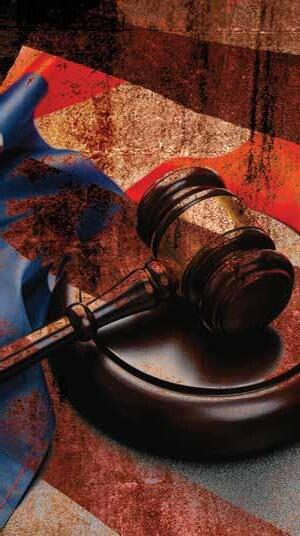
5 minute read
America on Trial: A Defense of the Founding
by Robert Reilly
REVIEW BY DR. BOLEK K. KABALA Assistant Professor of American Politics in CCU's School of Humanities & Social Sciences
With civic unrest reaching new heights, Robert Reilly’s America on Trial: A Defense of the Founding arrives at a crucial time. On the Left, the 1619 Project sees white supremacy as America’s core. On the Right, Patrick Deneen, Michael Hanby, and others discover in the Constitution and Federalist Papers a “poison pill” of individualism leading to relativism and cultural decline. Reilly finds this convergence disheartening. Our disunited States need to recover Constitutional wisdom, but this first requires a defense of the American project.
What led to the American Founding? For Reilly, it was a specific set of ideas. To summarize, they represent a combination of natural law and theological insights or the legacy of Athens, Jerusalem, and Rome. Crucially, these foundational concepts are grounded in human nature and ordered towards an objective understanding of happiness. They include human equality, popular sovereignty, the foundational importance of consent, and the right of revolution. And they travel from the ancient world, through the medieval era (chapter 2) into the thought of Robert Bellarmine, Francisco Suarez, Richard Hooker, and Algernon Sidney (chapter 5). What is unique about the American Founding is not the ideas themselves but their application, and how they constitute a commonwealth.
This vision of human dignity supported by reason and natural law was not, on Reilly’s account, unopposed. Nominalism and voluntarism, as developed by William of Ockham and Martin Luther (chapters 3 and 4), held that there are no essences in nature and that it is exclusively God’s will and not reason that matters. Such metaphysical and theological ideas spill over into politics: absolutism, where a state is essentially only a reflection of the arbitrary will of a prince, is their progeny. According to Reilly, our charter of government is, therefore, a rejection of these extremes of modern thought. In an important sense, it reaffirms the constitutionalism of the Middle Ages (chapter 2), during which the existence of two powers (civil and ecclesiastical), often in tension, contributed over time to the checks and balances that support individual liberty.
Reilly makes clear that this project of reason, restored at the Founding, does not exclude those who dissent from the Church of Rome. Natural law is mistakenly sometimes considered a Catholic preoccupation. As Reilly shows, the Protestant Richard Hooker took it seriously in his17th-century defense of liberty in England (chapter 5). The Founders were aware of and quoted this important thinker.
Indeed, if anything, Reilly understates the strength of his own case. A tantalizing footnote in America on Trial (pg. 153), whose point is supported also by Scott Pryor in his work on Calvin and natural law, emphasizes continuities between Calvin and Thomas, if not Luther and Thomas, in the American colonial context.1 Luther himself, as Jarrett Carty has shown in a discussion of the Reformer’s commentary on Psalm 101 and his resistance of the Holy Roman Empire, accepted the importance of natural law — Reilly himself seems to acknowledge this as a later development in Lutheranism.2 (Also, and importantly: If every thinker prioritizing the will over the reason of God is responsible for absolutism and arbitrary rule, what of John Locke in An Essay Concerning Human Understanding and The Reasonableness of Christianity? His voluntarism in those works is accepted by Greg Forster, a Locke scholar whose interpretation of the author of the Second Treatise of Government Reilly favors).3 The Reformers can also be seen to contribute generally to the cause of popular government through the important doctrine of the priesthood of the believer, as pointed out by Quentin Skinner in his important The Foundations of Modern Political Thought, to which Reilly refers on more than one occasion.4
Reilly could even hold back less in discussing the Constitution and Declaration as instruments of freedom. The Declaration was certainly followed by the abolition of slavery in several states, as he points out, but there is also no "enforcement mechanism" in the Constitution to guarantee the return of runaway slaves in Article IV, which was a body blow to slaveholders. These minor observations aside, America on Trial addresses us with a fierce urgency. In uncovering the obscured natural law inspiration of our Constitution, it makes the case for our charter of government as enhancing human freedom in the face of new challenges to reason. In this and other ways, it is a blessing.
Footnotes
1 C. Scott Pryor, “God’s Bridle: John Calvin’s Application of Natural Law,” Journal of Law & Religion 22 (2006): 225–254.

2 Jarrett A. Carty, God and Government: Martin Luther’s Political Thought (Montreal: McGill-Queen’s University Press, 2017); Robert Reilly, America on Trial: A Defense of the Founding (San Francisco: Ignatius Press, 2017), 153.
3 Greg Forster, John Locke’s Politics of Moral Consensus (Cambridge: Cambridge University Press, 2005), 14.
4 Quentin Skinner, The Foundations of Modern Political Thought, Volume 2: The Age of Reformation (Cambridge: Cambridge University Press, 1978).
Reviewer Bio
DR. BOLEK Z. KABALA
Bolek Kabala (Ph.D., Yale University) is an Assistant Professor of American Politics in CCU's School of Humanities & Social Sciences at Colorado Christian University. He specializes in American politics, and in particular, different ways to conceptualize judicial review, as well as the overlap of politics and religion informed by 17th-century debates between Thomas Hobbes and Baruch Spinoza. His recent research applies notions of power, as contested by these early modern thinkers, to illuminate contemporary controversies in judicial politics. He is also the lead editor of the interdisciplinary Augustine in a Time of Crisis (Palgrave, 2021).









